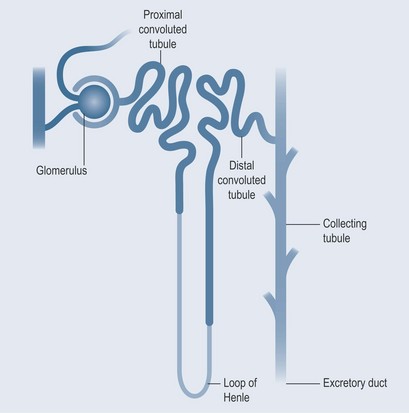Chapter 18 Drug excretion
Drug excretion can occur by several means:
Kidneys
• The liver makes most drugs and remedies water soluble for removal via the kidneys (see Figure 17.1, p. 131).
• One-fifth of the plasma reaching the kidney glomerulus is filtered through the pores in the glomerular cell membrane. The rest passes through the blood vessels around the renal tubules (Figure 18.1).
• Substances with a low molecular weight and not bound to plasma proteins can easily pass through the cell membranes into the tubules.
The factors affecting the rate at which the drug or remedy is excreted by the kidneys are:
Kidney Disease
Useful complexes such as plasma proteins (see Chapter 16 ‘How do drugs get into cells?’, p. 126) can be lost, increasing the amount of unbound remedy in the body, with resulting toxicity. Other compounds may be lost in the urine as the reuptake is reduced.
pH of Urine
The pHs of the urine and blood are interrelated. Tubular secretion, which takes place in the kidneys, is an active process whereby certain molecules and ions are removed from the blood and actively secreted into the tubules. From the buffering equation (Figure 18.2), it is possible to see that:
• When the pH of the blood decreases, more hydrogen ions need to be secreted (thus removing them) to maintain the balance.
< div class='tao-gold-member'>
Only gold members can continue reading. Log In or Register to continue
Stay updated, free articles. Join our Telegram channel

Full access? Get Clinical Tree



